Spring 2012 - Disability Services Commission
Spring 2012 - Disability Services Commission
Spring 2012 - Disability Services Commission
Create successful ePaper yourself
Turn your PDF publications into a flip-book with our unique Google optimized e-Paper software.
Family, friends, community—a good life<br />
<strong>Spring</strong> <strong>2012</strong><br />
Family, friends, community—a good life<br />
1
About the<br />
magazine<br />
‘People and Communities’ is produced by the<br />
<strong>Disability</strong> <strong>Services</strong> <strong>Commission</strong>’s state-wide<br />
Local Area Coordination program. Local Area<br />
Coordinators (LACs) are based in metropolitan,<br />
rural and regional areas of Western Australia to<br />
support people with disability.<br />
The magazine is published three times a year and<br />
private submissions are welcomed. Please note<br />
that we reserve the right to edit submissions.<br />
‘People and Communities’ is available at:<br />
http://www.disability.wa.gov.au > Publications<br />
and links > People and Communities.<br />
All communication should be directed to:<br />
The Editorial Coordinator<br />
People and Communities magazine<br />
<strong>Disability</strong> <strong>Services</strong> <strong>Commission</strong><br />
Local Area Coordination directorate<br />
PO Box 441<br />
West Perth WA 6872<br />
Phone: 9426 9317<br />
Freecall: 1800 998 214 (country callers)<br />
Fax: 9322 1397<br />
TTY: 9426 9315<br />
Email: lacmagazine@dsc.wa.gov.au<br />
Neither the <strong>Disability</strong> <strong>Services</strong> <strong>Commission</strong><br />
("DSC") nor the State of Western Australia<br />
("State") shall be responsible for the reliability,<br />
usefulness or the accuracy of the content of<br />
this publication ("Content"). Neither the DSC<br />
nor the State shall be liable, in negligence or<br />
howsoever, for any loss, damage or liability<br />
incurred by anyone relying on the Content. The<br />
DSC may review, edit or exclude any submitted<br />
material which is sought to be included as<br />
Content. No Content can be reproduced without<br />
the prior written permission of the DSC.<br />
© <strong>2012</strong><br />
ISSN 1838-0021<br />
This magazine is printed on 100 per cent<br />
recycled paper.<br />
Cover image: Naomi Lake at work in the<br />
Vancouver Café in Albany.<br />
Newslines<br />
Welcome to the third edition of ‘People<br />
and Communities’ magazine, and more<br />
inspirational stories about people’s<br />
challenges, successes and the lessons they<br />
learn along the way.<br />
Many of these stories celebrate the importance<br />
of community spirit. We learn about a Perth<br />
mother whose contribution to the disability<br />
sector spans nearly five decades.<br />
We also learn about a parent-initiated arts<br />
program in Margaret River that is still going<br />
strong three years after its inception as a<br />
six-week pilot project.<br />
In another story, an Albany café owner<br />
explains how her strong sense of social<br />
justice, and her belief that all people should<br />
be supported to reach their potential,<br />
has resulted in increased employment<br />
opportunities for young people in the area.<br />
The importance of planning for the future—<br />
the move from primary to secondary<br />
school and leaving the family home to live<br />
independently—is highlighted in some stories<br />
from the Perth region.<br />
And in another story, a young Donnybrook<br />
woman has a plan that includes her goals to<br />
take part in the 2015 Special Olympics.<br />
Read about the benefits which acrossgovernment<br />
collaboration have brought<br />
to an eight-year-old Wyndham boy's daily<br />
schooling experience.<br />
We also share the story of a man living in<br />
Torbay, a small semi-rural community located<br />
halfway between Denmark and Albany, who<br />
mentors a young man who shares his interest<br />
in working with machinery.<br />
We hope you enjoy reading these stories<br />
and we look forward to your feedback on this<br />
edition of ‘People and Communities’.<br />
Chris Yates<br />
Acting Executive Director<br />
Local Area Coordination<br />
Mettle detector: mentoring and<br />
training have positive outcomes<br />
George Renwick is a very determined<br />
person who is not prepared to let<br />
health issues stand in the way of his<br />
love of working with machinery.<br />
Seven years ago, George and his family moved<br />
to Torbay, a small semi-rural community located<br />
halfway between Denmark and Albany.<br />
Involved in the metal trades industry all his<br />
working life, the 58-year-old ran a heavy<br />
equipment plant hire business in the town. But<br />
five years ago, George was diagnosed with<br />
cerebellar ataxia, a condition that affects speech,<br />
balance, walking and muscle coordination.<br />
The Renwick family’s LAC Helen Soerink said<br />
while George now needed support to do most<br />
things, their planning centred on how he could<br />
keep working in his home workshop for as long<br />
as possible.<br />
George was interested in a reciprocal<br />
arrangement where he could share his metal<br />
trades experience with someone interested in the<br />
area while receiving the support he needed to<br />
continue working at home.<br />
At George's suggestion, Helen contacted the<br />
Great Southern Institute of Technology and<br />
liaised with TAFE metal trades lecturer<br />
David Christophers.<br />
"Once David met George and visited the<br />
workshop, he happily agreed to proceed with the<br />
teaching and mentoring arrangement," Helen said.<br />
A young pre-apprentice, Jamie Kelly, accepted<br />
the opportunity to do the practical component of<br />
his course with George.<br />
Jamie’s work was scheduled in blocks of one day<br />
a week from March to December 2011.<br />
"Jamie and I got on extremely well to the extent<br />
that he often worked with me beyond his allotted<br />
course requirements," George said.<br />
"I think David put a lot of effort into finding the right<br />
pre-apprentice to fit with my personal situation.<br />
"Without that effort, I don’t think the arrangement<br />
would have worked."<br />
George mentored Jamie in boilermaking,<br />
welding, using different types of equipment and<br />
also taught him the importance of work safety.<br />
"It was a perfect match," George said.<br />
"Once he was capable and proficient, Jamie<br />
was able to handle parts of the work I could no<br />
longer manage."<br />
For Jamie, the opportunity to work with someone<br />
as experienced as George was invaluable.<br />
George was impressed by Jamie’s enthusiasm<br />
and keen desire to learn as much as possible.<br />
"Through one of my industry contacts in Perth, I<br />
was able to secure a boilermaking apprenticeship<br />
for Jamie," he said.<br />
"I was absolutely delighted when Jamie started<br />
his apprenticeship earlier this year.<br />
"We still keep in touch and I’m hoping I will<br />
be able to secure further TAFE teaching and<br />
mentoring opportunities."<br />
George Renwick in his workshop.<br />
Family, friends, community—a good life<br />
3
Setting goals key<br />
to achieving dreams<br />
Using a strengths-based, goal-oriented<br />
approach for planning a good life has<br />
worked well for 21-year-old<br />
Nicolina Dreaver.<br />
Nicolina lives on a Donnybrook property where<br />
her family grows fruit and trains horses.<br />
One of twins, Nicolina’s start in life was marked<br />
by severe infantile seizures and an early<br />
diagnosis of vision impairment.<br />
By age eight, her vision issues were identified as<br />
being developmental in origin.<br />
This meant Nicolina’s vision improved over the<br />
years and is now well-managed.<br />
But the early seizures caused frontal lobe brain<br />
scarring which has resulted in lifelong challenges.<br />
Nicolina’s mother Marilyn is a complex needs<br />
teacher and a strong advocate of education that<br />
focuses on people’s strengths and abilities to<br />
achieve positive outcomes.<br />
Nicolina Dreaver riding Forget<br />
Not Sophie.<br />
Nicolina with her father Murray<br />
Dreaver.<br />
"My advice to parents is never give up on the<br />
best options for their child," Marilyn said.<br />
"It sometimes takes courage to speak up and<br />
advocate on behalf of them.<br />
"However, being well-informed and<br />
knowledgeable about services and support are<br />
essential in making things happen.<br />
"Schooling was difficult for Nicolina but with<br />
support and mentoring she completed high school<br />
and went on to TAFE study, completing Certificate<br />
III in Education Support in April last year."<br />
Marilyn said it took 18 months of hard work for<br />
Nicolina to complete the course.<br />
"This qualification means she can work as a<br />
teacher’s assistant," she said.<br />
"However, Nicolina has decided to pursue her<br />
passion for training horses.<br />
"Setting goals, priorities and working to achieve<br />
them have been important in our planning process.<br />
"When you have plans for what<br />
you want to do in life, it provides<br />
clarity and a vision for the future."<br />
Building on the success of achieving her<br />
educational goal, Nicolina and her family sought<br />
other challenges including securing a place in<br />
equestrian events at the 2011 Special Olympics.<br />
Nicolina is flanked by her mother Marilyn<br />
Dreaver (left) and her coach Joanne Campbell.<br />
The Dreaver family’s LAC Faye Pedalina<br />
assisted by identifying funding opportunities<br />
that helped meet the costs of preparing for the<br />
equestrian events.<br />
In 2010, as a way to help achieve her Special<br />
Olympics goal, Nicolina joined the Riding<br />
Develops Ability (RDA) club in Collie.<br />
"Joining the club and participating with people<br />
from all walks of life was a tremendous<br />
confidence boost for Nicolina," Marilyn said.<br />
"In October 2011, Nicolina won one gold and one<br />
bronze medal at the Special Olympics in Perth.<br />
This was a fantastic achievement."<br />
Nicolina has continued her involvement with<br />
RDA where she now works as a volunteer and is<br />
currently training to become a coach.<br />
"There are several levels of coaching and my<br />
training will allow me to work with small groups of<br />
people—including young children, teenagers and<br />
young adults," Nicolina said.<br />
"Part of my planning also includes participating<br />
in the 2015 Special Olympics and I’m already<br />
involved in Western Australia’s selection process.<br />
"I feel really positive about achieving my goals<br />
and dreams."<br />
Family, friends, community—a good life<br />
5
Clay dogs bark up<br />
the right tree<br />
A love of ceramics looks like turning<br />
into a viable business opportunity for<br />
36-year-old Warnbro resident<br />
Rebecca Johnston.<br />
When she started classes at the Rockingham<br />
Community Art Room in 2007, Rebecca thought<br />
she could only draw stick people—but then her<br />
father showed her how to draw a dog.<br />
"That’s when I started producing clay dogs based<br />
on Pippa, a dog I used to own," Rebecca said.<br />
With the art group’s support, she experimented<br />
with design, materials and glazing until she<br />
developed her ideal clay dog which she now<br />
displays at various metropolitan art exhibitions.<br />
The Victoria Park Centre for the Arts has some of<br />
Rebecca’s clay dogs for sale in its gift shop. She<br />
also hopes to find a suitable Fremantle outlet<br />
and set up a stall during market days at either<br />
Balingup or Nannup.<br />
Since beginning production in November 2010,<br />
Rebecca does her best to meet people buying<br />
her clay dogs, joking she wants to "make sure<br />
they all go to good homes".<br />
At the suggestion of one of the community art<br />
room artists, Rebecca is now exploring the<br />
possibility of producing much larger dogs as<br />
public art.<br />
Rebecca’s public art dogs could provide pet owners<br />
with a place to securely attach dog leads—through<br />
rings in their necks, forming a collar.<br />
LAC Rosa Padilla (left), George Johnston<br />
and his daughter Rebecca.<br />
Rebecca Johnston with a few<br />
of her ceramic creations.<br />
To determine production costs, she is working<br />
with her fellow artists on a prototype park dog.<br />
Rebecca is also keen to ensure the quirky appeal<br />
of her dogs is captured in larger versions.<br />
The community art room coordinator has<br />
arranged for a land developer to donate $1,000<br />
towards the project. If it goes well, the developer<br />
will consider installing one of the clay dogs<br />
on-site.<br />
"I’m hoping with one of the larger dogs on<br />
display, I might receive orders from other<br />
developers and local councils," Rebecca said.<br />
"Later this year I am planning to produce dog key<br />
rings, jewellery such as brooches and Christmas<br />
dogs in red and green colours.<br />
"With the assistance of the Rockingham<br />
Community Art Room facilitator, we are hoping to<br />
develop a website promoting my quirky dogs to<br />
the wider community."<br />
With Rebecca’s future looking bright, her plans<br />
also include joining the Rockingham Regional<br />
Arts Group to expand her connections within the<br />
local art community.<br />
Community-based TAFE training<br />
raises students’ expectations<br />
Six young adults with disability living<br />
in the Karratha area successfully<br />
completed a short, specially-designed<br />
TAFE program last year.<br />
Arranged in part through planning in relation to<br />
training, development and extended learning<br />
goals, the program included three modules from<br />
the Certificate 1 TAFE computing course.<br />
"For many of the participants it was their first<br />
TAFE course," LAC Ally Krueger said.<br />
"The students learnt about the internet, using<br />
email and preparing Word documents. However,<br />
all participants—and their parents—reported<br />
fantastic outcomes that extended well beyond the<br />
subject material covered in the program.<br />
"Outcomes included increased self-esteem,<br />
empowerment, a genuine sense of achievement<br />
and optimism for future learning opportunities."<br />
Ally said that all participants had experienced limited<br />
access to further education opportunities locally.<br />
Although the course was not organised with<br />
employment opportunities in mind, all of the<br />
young people now expressed an interest in<br />
exploring options and gaining skills that would<br />
help them in the workforce.<br />
Big Plan supports<br />
youth with disability<br />
This plan assists school leavers or young<br />
adults with disability to map out their future.<br />
The process is similar to person-centred<br />
planning, in that family and friends participate<br />
and provide support to plan activities and<br />
contribute to discussions.<br />
The Big Plan is an opportunity for individuals,<br />
regardless of their ability, to plan for the future.<br />
For more information: contact your LAC.<br />
The students have a range of disabilities<br />
including autism, intellectual disability, mental<br />
illness and physical disabilities.<br />
Trish Solly, whose son Ben completed the course,<br />
said her family had seen a massive change in him.<br />
"Ben really liked the structured learning<br />
environment," Trish said.<br />
"The course gave him a sense of purpose and<br />
something positive to focus on.<br />
"Attending the TAFE program<br />
has motivated Ben to raise his<br />
expectations and to think about<br />
other courses he might like<br />
to complete."<br />
To celebrate the success of the TAFE program,<br />
the Karratha LAC team arranged a celebration<br />
dinner for the students at a local restaurant.<br />
"It was a terrific evening with so many reasons to<br />
celebrate," Ally said.<br />
"I’m hopeful that given the success of this<br />
program, further community-based TAFE learning<br />
opportunities for students with disability will be<br />
available this year," Ally added.<br />
Community and<br />
Family Living Plans<br />
These <strong>Commission</strong> initiatives aim to provide<br />
planning and support options for individuals and<br />
families with disability.<br />
Community Living includes a broader range of<br />
alternative community living arrangements for adults.<br />
Family Living—an allied initiative—aims to enhance<br />
and build family well-being and assist family members<br />
with disability to lead a good life while living at home.<br />
For more information: contact your LAC.<br />
Family, friends, community—a good life<br />
7
Michael Ralston (centre) with his parents Ann and Bryan.<br />
Planning strengthens<br />
independent living<br />
Two years ago, Michael Ralston moved<br />
into his own home in Gosnells—and<br />
now couldn’t be happier.<br />
"I love having my own space and being<br />
independent," he said.<br />
"I work four days a week and I find living close to<br />
public transport is great because I catch the train and<br />
then cycle the rest of the way to work."<br />
Michael said with a support network of family and<br />
friends around him, he feels safe and secure in<br />
his own home.<br />
"We were quite happy having Michael living at<br />
home and there was no big push for independent<br />
living," his mother, Ann Ralston said.<br />
But she was aware of the need to start planning<br />
for his future.<br />
In 2007, Michael, his family and their LAC started<br />
the process.<br />
"Using the person-centred approach, our<br />
planning revolved around Michael’s goals,<br />
aspirations and dreams," Ann said.<br />
"My husband Bryan and I always knew the move<br />
couldn’t be forced—Michael had to make that<br />
decision himself—and in his own time.<br />
"We just wanted to make sure we had plans<br />
in place."<br />
Ann said the family always talked with Michael<br />
about living more independently, discussed<br />
what living independently involved and obtained<br />
information on what services were available.<br />
It wasn’t until Ann and Michael attended a<br />
Community Living Plan presentation that he<br />
decided to live in his own home.<br />
Once funding was in place, the most challenging<br />
part of the process—from the family’s point of<br />
view—was finding suitable housing for Michael.<br />
"We looked at so many properties before we<br />
found the right one," Ann said.<br />
"Michael’s unit had to be in our local area, close<br />
to shops and it had to be somewhere where he<br />
felt at home and secure."<br />
Ann said it took a year to find the right home for<br />
39-year-old Michael. A housing agency bought the<br />
property and rented it to Michael, in accordance<br />
with the public housing rental process.<br />
"It’s wonderful for the family to<br />
see Michael happily settled in<br />
his own home," Ann said. "By<br />
using person-centred planning<br />
tools, Michael has been able to<br />
make informed choices and<br />
plan for his future."<br />
Michael has about 24 support network members who<br />
care about him and take an interest in his well-being.<br />
There is also a smaller working group of six people<br />
(including Michael and a facilitator) who meet every<br />
six weeks to discuss what’s happening and what<br />
needs to be done as part of the planning process.<br />
The working group also sends out a newsletter to all<br />
support network members.<br />
Ann said the process was working well and<br />
regular meetings remind Michael he has a<br />
support network.<br />
"Michael has also been very careful about<br />
personal safety issues—another important<br />
consideration in the planning process," she said.<br />
"From living at home with the family, Michael<br />
developed the general housekeeping skills he<br />
needs, such as cleaning, washing, and ironing,<br />
to manage in his own home."<br />
When it comes to shopping and meal<br />
preparation, Michael receives some agency<br />
support one day a week. As a result of the<br />
planning process, Ann believes Michael is coping<br />
amazingly well since moving to his own home.<br />
"We miss him terribly but he has gained greater<br />
self-confidence and is developing the skills he<br />
needs to maintain independent living," she said.<br />
"A while back the roof at his home was leaking so<br />
he called the housing agency and organised the<br />
maintenance work.<br />
"As parents, we wanted to make sure Michael<br />
was happy living independently and that he was<br />
comfortable in his own home.<br />
"We also wanted to make sure he had people<br />
look out for him when we are no longer around."<br />
The best advice for parents dealing with similar<br />
situations, according to Ann, is to make things<br />
happen for their son or daughter.<br />
"You can’t wait for other people to ask you if you<br />
need assistance," she said.<br />
"You have to be prepared to take the first steps.<br />
"Seek out people who might be able to help,<br />
get as much information as you can and start<br />
planning early."<br />
When asked what he liked most about living<br />
independently, Michael said it was being able to<br />
do what he wanted, when he wanted.<br />
"Moving into my own home provided me with a<br />
different lifestyle," he said. "It’s been a<br />
good move."<br />
Family, friends, community—a good life<br />
9
Making the grade<br />
in Wyndham<br />
Imagine the challenges faced by an eight-yearold<br />
with autism and an intellectual disability,<br />
living in one of Western Australia’s most<br />
remote communities. Josiah Bambra lives in<br />
Wyndham, the State’s most northern town, with<br />
a population of about 800.<br />
However, help is at hand for Josiah and his dayto-day<br />
schooling experience, thanks to the Local<br />
Area Coordination program. LAC Deb Craigie<br />
assists Josiah’s parents Priscilla and Joseph and<br />
their extended family, helping to ensure Josiah<br />
attends school on a regular basis.<br />
Deb said the importance of Josiah’s school<br />
attendance went beyond learning in a<br />
classroom environment. He is encouraged<br />
to play with other children, participate in the<br />
school routine and learn social skills.<br />
In addition to Deb’s assistance, visiting<br />
community and health professionals provide<br />
services including advocacy and additional<br />
family support that help improve the school<br />
experience for Josiah and other students with<br />
disability. Deb noted that service providers<br />
generally travel from Kununurra—a one-hour<br />
drive each way.<br />
“But it’s not uncommon for some service<br />
providers to travel from Darwin, Broome and<br />
Perth,” Deb said.<br />
“By providing these services, we try to ensure<br />
students with disability have every opportunity<br />
to learn and become part of an inclusive,<br />
vibrant school community.<br />
“Teaching staff are very supportive and school<br />
psychologists also offer advice and strategies<br />
to address any concerns families may have<br />
about their children.”<br />
Deb said solutions to more practical issues,<br />
such as transport to and from school, can be<br />
resolved through a team approach.<br />
“We believe this approach has lifelong benefits<br />
to students and their families,” she said.<br />
Centre manager Jen Spriggs (left) with<br />
lifeguard Emma Hancox testing the<br />
new pool hoist equipment.<br />
Grants program<br />
helps Geraldton<br />
community make<br />
a splash<br />
Thanks to an accessible communities<br />
grant from the <strong>Commission</strong>,<br />
Geraldton’s Aquarena Centre is<br />
once again fully accessible for<br />
people with disability.<br />
The grants are provided as part of the State<br />
Government’s Count Me In: <strong>Disability</strong> Future<br />
Directions strategy.<br />
For many years, the centre catered for<br />
swimmers with disability but the existing<br />
equipment was in need of replacement.<br />
There had also been difficulties with<br />
wheelchairs and hoists being unavailable at<br />
times due to maintenance issues.<br />
Funding allowed the centre to buy two new<br />
wheelchairs (one wet, one dry), a change table<br />
and a mobile pool hoist.<br />
All equipment and products were purchased<br />
locally and delivered in December last year.<br />
Recognition<br />
for a lifetime of<br />
contribution<br />
Orelia resident Vicki de Haas has been awarded<br />
the Medal of the Order of Australia after her<br />
contribution to the State’s disability sector over<br />
almost half a century.<br />
The 84-year-old credits the honour to her son<br />
Gerard—the youngest of her five children—<br />
because it was his arrival that inspired her to<br />
make a difference for people with disability.<br />
"In the early 1960s, when Gerard was growing<br />
up, there were limited services for young people<br />
with intellectual disability and their families,"<br />
Vicki said.<br />
"It became clear to me I had to be proactive in<br />
trying to open up opportunities for Gerard.<br />
"I was keen to raise community awareness and<br />
actively began lobbying local, state and federal<br />
government agencies along the way.<br />
"I wanted to help ensure young people who live<br />
with intellectual disability have prospects for a<br />
brighter future and opportunities for productive<br />
and enjoyable lives in their local communities.<br />
My Way offers choice to have it your way<br />
<strong>Disability</strong> <strong>Services</strong> Minister Helen Morton has<br />
confirmed the State Government’s commitment<br />
to putting choice and control where it belongs—in<br />
the hands of people with disability, families and<br />
carers—with the July announcement of four<br />
My Way project locations.<br />
My Way, which will be implemented in close<br />
partnership with the non-government sector, aims to<br />
improve the choice, flexibility and control that people<br />
with disability have over their supports and services.<br />
The project will be implemented in Perth’s Hills and<br />
Cockburn/Kwinana LAC service areas and also in<br />
the Goldfields and the Lower South West.<br />
People living in these locations, who are eligible<br />
for <strong>Commission</strong>-funded and provided services,<br />
Vicki de Haas with her son Gerard.<br />
"There have been many positive changes for<br />
people with disability over the past decades,"<br />
Vicki said.<br />
"However, I think everyone would agree, overall,<br />
there is more that can be done.<br />
"Volunteering and helping others is one way<br />
people can make a positive difference in their<br />
local community.<br />
"When people volunteer their time, they are<br />
making a connection with their community and<br />
everyone benefits."<br />
can choose to take part in the three-year project.<br />
Community information sessions and individual<br />
meetings have been held since July.<br />
My Way Executive Director Robyn Massey said the<br />
project would inform how disability supports and<br />
services will be provided in the future.<br />
“My Way will support individuals, families and<br />
carers to take control, to the extent that they desire,<br />
in designing and managing the supports and<br />
services they need to live a good life in their local<br />
community,” Ms Massey said.<br />
For more information visit<br />
www.disability.wa.gov.au > <strong>Disability</strong> reform ><br />
My Way or email myway@dsc.wa.gov.au .<br />
Family, friends, community—a good life<br />
11
Sam Tan practising the piano at home, with his mother Michelle.<br />
Love of music hits right note in<br />
shaping and developing abilities<br />
Playing the piano has had a major<br />
impact on 14-year-old Sam Tan's<br />
quality of life.<br />
Living in Winthrop with his parents and younger<br />
brother, he was diagnosed with autism and<br />
intellectual disability at age four.<br />
Sam’s mother Michelle started teaching him piano<br />
as a five-year-old which led to improvements in<br />
his education through mainstream government<br />
primary school classes.<br />
Initially, the early primary years were difficult in<br />
terms of Sam adjusting to new environments<br />
and teachers.<br />
But from Year 4 onwards, things became<br />
easier because teachers could see<br />
improvements in Sam’s ability to take part<br />
in mainstream education.<br />
"Having fellow students and teachers<br />
acknowledge Sam’s musical and artistic abilities<br />
helped him feel more confident within himself,<br />
accepted by the school community and more<br />
able to participate in other activities with his<br />
peers," Michelle said.<br />
"When Sam reached grade two in the Australian<br />
Music Education Board syllabus, he decided to<br />
learn musical themes from the movies and TV<br />
series he watched.<br />
"He also loves Christmas carols and has learnt<br />
about 20 so far."<br />
Sam played the piano at class assemblies, endof-year<br />
concerts and local church events.<br />
"Sam’s musical abilities<br />
have had a positive influence<br />
on other areas, including<br />
motor skills," Michelle said.<br />
"In particular, his swimming skills have improved<br />
and he seems better equipped to understand the<br />
speed and rhythm of each stroke."<br />
When asked about transition planning<br />
for secondary school, Michelle said the<br />
process had been extremely useful.<br />
"We visited a number of schools and<br />
talked to staff about Sam and his needs,"<br />
she said.<br />
"Like all parents, we wanted a school<br />
environment that would help our son<br />
deal with life’s challenges and provide<br />
courses to maximise his future employment<br />
opportunities."<br />
As part of the transition process, Sam<br />
attended therapy sessions to improve his<br />
ability to read school maps, making him<br />
better equipped to navigate school buildings<br />
and move from classroom to classroom.<br />
He also received support to help him socialise,<br />
cope with any bullying that might occur and handle<br />
money and buy lunch at the school cafeteria.<br />
"Sam loved Year 8," Michelle said. "He had a<br />
teacher’s aide in some classes and studied<br />
independently in others.<br />
"Every day, Sam looked forward to going to school."<br />
Guided by Sam’s Year 8 experience, Michelle<br />
said some aspects of his Year 9 schooling would<br />
be handled differently.<br />
Changes have included more opportunities<br />
for Sam to attend mainstream classes in his<br />
favourite subjects—photography and cooking—<br />
and ensuring he participated in the school camp.<br />
Michelle Tan (left) and Sam with the family’s<br />
LAC Sandra Murray.<br />
Parents in similar situations should give children<br />
the opportunity to experience music, preferably at<br />
a young age, according to Michelle, whether it’s<br />
learning an instrument or singing in the school choir.<br />
"While Sam’s vocabulary and speech is limited,<br />
singing helps stimulate his learning," she said. "He<br />
can memorise a whole song if he really likes it.<br />
"Sam practices the piano nearly every day. He<br />
loves the routine that encourages him to improve<br />
his playing."<br />
In turn, Sam’s playing boosts his self-esteem,<br />
pride in his achievements and sense of belonging<br />
in the community.<br />
"Every child and their situation<br />
is different," Michelle said. "But<br />
I feel it’s important to maximise<br />
your child’s exposure to a range of<br />
learning opportunities and social<br />
activities from a young age."<br />
"We travel a lot but when Sam was younger,<br />
travelling was difficult for him.<br />
"Over time, Sam became less afraid of new<br />
experiences and more confident dealing with<br />
noise and the hustle and bustle of new places<br />
and new people."<br />
Family, friends, community—a good life<br />
13
Some of the Artzability group members and support workers.<br />
Art with heart inspires creative<br />
community spirit in Margaret River<br />
A six-week art project set up by<br />
parents of young adults with disability<br />
in Margaret River has been such<br />
a success it is still running three<br />
years later.<br />
Artzability was originally developed after<br />
discussions with families about their planning<br />
goals and how they could be achieved, according<br />
to LAC Valerie Mansfield.<br />
"Families wanted to use art as another way for<br />
their sons and daughters to connect with their<br />
local community, learn new skills and develop<br />
social friendships," she said.<br />
Margaret River parents Gail Warren and Trina<br />
Duggan were the driving forces behind the program.<br />
"It provides young adults and their support<br />
workers with opportunities to socialise, meet local<br />
artists, chat with volunteers and experience the<br />
joy and sense of accomplishment that comes<br />
with developing your artistic abilities," Gail said.<br />
"There is no right or wrong way when it comes to<br />
expressing yourself creatively."<br />
Local arts worker Margot Edwards facilitates<br />
the activities.<br />
She said the ongoing challenge was to provide<br />
a balanced, weekly arts program that created<br />
an environment where participants could come<br />
together as a cohesive social group.<br />
Arts worker Margot Edwards<br />
(left) with Marlee Linton.<br />
David Mottershead (left) with<br />
support worker Mike Goodwin.<br />
"Our aim is to provide projects based on the<br />
group’s ideas and abilities, as well as fostering<br />
strong social connections and friendships that<br />
extend beyond our art sessions," Margot said.<br />
"Having a network of friends is important for<br />
everyone, especially young people."<br />
In early 2011, the Augusta-Margaret River<br />
Shire asked Artzability to produce work for the<br />
Banners in the Terrace Competition, one of the<br />
State’s biggest community arts projects.<br />
Each year, the competition brings St Georges<br />
and Adelaide terraces to life with works painted<br />
by community groups, art groups, school<br />
children and professional and non-professional<br />
artists. Each local government can enter<br />
one banner.<br />
"Developing the concept involved a lot of group<br />
discussion and planning with our banner artist<br />
Dea Haddow," Margot said.<br />
"Everyone contributed their ideas and once the<br />
artwork had been decided, each participant<br />
painted a section of the banner.<br />
"As a group, we were all excited when our<br />
Margaret River banner was displayed in Perth in<br />
October last year."<br />
Artzability has several activities planned for<br />
<strong>2012</strong> including graffiti art and repeat<br />
Future planning<br />
Person-centred planning is an<br />
individualised approach to planning which<br />
takes into account a person’s unique<br />
circumstances and ideas for the future.<br />
The planning involves building on<br />
natural support systems within the<br />
family and community by gathering<br />
together people who are keen to have<br />
an on-going involvement in helping a<br />
person with disability plan for the future.<br />
For more information: contact your LAC.<br />
LAC Jamie Ashton (left), Teneal Duggan,<br />
and LAC Valerie Mansfield at a Margaret<br />
River planning session.<br />
performances of its play Alice in<br />
Southwesterland for pre-primary school students<br />
and childcare centres in Margaret River.<br />
"The play is about Alice, who is non-verbal,"<br />
Margot said. "She gets lost in Southwesterland,<br />
makes her way to the tourist bureau and<br />
eventually meets up with the Mad Hatter, the<br />
March Hare and other characters.<br />
"Activities such as these provide opportunities<br />
for our Artzability group members to socialise,<br />
have fun working together and contribute to the<br />
local community.<br />
"While Artzability started as a parent-driven<br />
program, it’s very much participant-driven now."<br />
Family, friends, community—a good life<br />
15
Taekwondo kick-starts teen's<br />
achievements<br />
Martial arts have played a key role in<br />
helping 14-year-old Braeden Sprigg<br />
who has high functioning autism and<br />
attention deficit hyperactivity disorder.<br />
Diagnosed at age five, the combination meant<br />
that, along with extremely high energy levels,<br />
Braeden had behavioural issues and difficulties<br />
interacting with other children in social situations.<br />
"Braeden was a handful and, on the advice of his<br />
paediatrician, it was suggested joining a martial<br />
arts club might provide a structured environment<br />
where he could channel his energies," his mother<br />
Merlene said.<br />
In 2006, Braeden joined the local Narrogin<br />
taekwondo club, training once a week. From the<br />
outset, he enjoyed the routine of learning specific<br />
sets and patterns associated with the series of<br />
belts studied—starting with the white belt and<br />
culminating in the black belt.<br />
While benefiting from the physical aspects of<br />
training, Braeden also began to enjoy being part<br />
of the taekwondo community.<br />
"With each taekwondo grading, Braeden was<br />
promoted to the next belt level," Merlene said.<br />
"While the grading process is physically and<br />
mentally demanding, it really helped build<br />
Braeden’s social confidence and self-esteem as he<br />
had to demonstrate his taekwondo skills in front of<br />
examiners, instructors and fellow students."<br />
Competing and succeeding in social situations<br />
was an achievement for Braeden while<br />
taekwondo taught him the importance of being<br />
able to focus on activities.<br />
"Braeden’s school teachers have commented<br />
on how well he has learnt to self-regulate,"<br />
Merlene said.<br />
"I feel the control needed in<br />
taekwondo has helped develop<br />
this ability.<br />
Braeden Sprigg practising taekwondo<br />
at home.<br />
"Along with reduced behavioural issues, Braeden<br />
now accepts you have to practise to improve in<br />
school subjects, too."<br />
Once Braeden reached blue belt level, he began<br />
attending classes twice a week—and Merlene<br />
started learning taekwondo so she could help him<br />
practise at home.<br />
Building on his grading successes, Braeden<br />
began entering tournaments, competing in<br />
activities that demonstrated his ability to master<br />
complex patterns and sparring exercises.<br />
His ability to focus on taekwondo, in a range of<br />
different environments, and in front of strangers<br />
provided an additional confidence boost.<br />
"Receiving his black belt in May last year was a<br />
tremendous accomplishment," Merlene said.<br />
"As Braeden is now 14, he is eligible to become<br />
an assistant coach.<br />
"I currently hold a coaching position, so Braeden<br />
and I are able to take classes under the direction<br />
of our head instructor.<br />
"Providing coaching has helped develop<br />
Braeden’s sense of responsibility, as well as<br />
earning him respect among his peers.<br />
"Without a doubt, taekwondo has been<br />
instrumental in Braeden’s many achievements<br />
and continues to pay dividends in all aspects of<br />
his life."<br />
Norseman to Esperance cycling<br />
event benefits local community<br />
The Clontarf Foundation’s South East<br />
Coast Football Academy (SEFA) raised<br />
$10,000 for local organisations after<br />
a fundraising bike ride in November<br />
last year.<br />
Three people using the <strong>Commission</strong>’s Local<br />
Area Coordination program were among<br />
community members who benefited from the<br />
fundraising activities.<br />
Jaimen Hudson and Glenn Neville received<br />
donations that will help them participate in Walk<br />
On, an intensive exercise program developed in<br />
partnership with Spinal Cord Injuries Australia and<br />
Edith Cowan University’s Joondalup campus.<br />
Clontarf has also invited Jaimen and Glenn to<br />
talk to students about the importance of spinal<br />
cord safety and staying safe when participating in<br />
recreational activities.<br />
Deborah McKean was given a $1,000 donation to<br />
buy an iPad and communication program for her<br />
16-year-old daughter Emma, who has autism and<br />
is non-verbal.<br />
Esperance LAC Shaun Beros attended the SEFA<br />
awards night, describing the evening’s highlight<br />
as the presentation of certificates representing<br />
money raised by Aboriginal students involved in the<br />
fundraising event.<br />
Perth to Broome great bike hike<br />
The Fairholme <strong>Disability</strong> Support Group is ready<br />
to take a bike hike—all for a good cause.<br />
From 19 August to 15 September, 12 riders will<br />
travel almost 2,500km from Perth to Broome<br />
supporting projects for people with disability in<br />
the local communities they visit.<br />
"It was a fantastic evening that provided Jaimen,<br />
Glenn and Deborah with opportunities to meet<br />
Clontarf staff and formally thank the boys for their<br />
fundraising efforts," Shaun said.<br />
Clontarf is keen to build on its existing relationship<br />
with disability sector agencies, according to Shaun.<br />
"While the partnership has many benefits, Clontarf<br />
aims to provide its Aboriginal students with greater<br />
opportunities to connect with people who have<br />
challenges and barriers to overcome in their day-today<br />
activities," he said.<br />
"These opportunities also include ways to support<br />
people with disability in their community.<br />
"In <strong>2012</strong>, Clontarf and LACs will be developing a<br />
recreation participation buddy program for schools,<br />
further expanding our relationship with sporting<br />
clubs in the Esperance area.<br />
"These partnership activities also<br />
provide an opportunity for the<br />
Local Area Coordination program<br />
to become better known in the<br />
local Aboriginal community."<br />
Taking in New Norcia, Moora, Coorow, Three<br />
<strong>Spring</strong>s, Dongara, Geraldton, Northampton,<br />
Carnarvon, Karratha and Port Hedland, people can<br />
help by donating at https://secure.greatbikehike.org.<br />
au/donate .<br />
People can also specify which community, project<br />
or rider to support.<br />
Family,<br />
Family,<br />
friends,<br />
friends,<br />
community—a<br />
community—a<br />
good<br />
good<br />
life<br />
life<br />
17 17
Jarrod de Wind’s portrait Do you see what I see?<br />
Evocative portrait invites reflection<br />
Eighteen-year-old Ballajura<br />
resident Jarrod de Wind has been<br />
immortalised in a painting called Do<br />
you see what I see?<br />
A finalist in the City of Perth’s Black Swan Prize<br />
for Portraiture, artist Jacquie Blight also submitted<br />
it for the 2011 Archibald Prize, one of Australia’s<br />
oldest and best-known visual arts awards.<br />
The painting was shown in Melbourne at the<br />
Hidden Faces of the Archibald, an exhibition<br />
highlighting selected works by Victorian artists<br />
who entered the competition but were not chosen<br />
for the official prize.<br />
Jarrod’s parents Priscilla and Gerry provided the<br />
following reflections on their son’s portrait.<br />
"Do you see what I see? is such a meaningful and<br />
powerful title for Jarrod’s portrait," they wrote.<br />
"As his parents, this rhetorical question resonates<br />
within us. We are deeply touched by Jacquie’s<br />
portrait of Jarrod and even more so that his gaze<br />
beckoned the same question of her.<br />
"Jarrod is the epitome of innocence and the<br />
embodiment of our family values and faith.<br />
"He attends Mass every Sunday and most often<br />
alongside all his siblings. It is truly an amazing<br />
sight to see his awe-inspiring gaze as he receives<br />
Holy Communion.<br />
"This year Jarrod will turn 19. He is unable to<br />
speak or walk unaided. It would be any parent’s<br />
perfectly natural reaction to ask why and to do<br />
everything possible to find that miracle cure.<br />
"As time unfolded we began to accept that this was<br />
how things were meant to be. Jarrod’s calm and<br />
peaceful demeanor runs deep to his very core.<br />
"We feel blessed to have such a pure and<br />
innocent soul placed among us. He brings out the<br />
best in all of us. Whenever we are together as a<br />
family, he is in high spirits, interacting and enjoying<br />
the fun and laughter.<br />
"Jarrod is everybody’s best friend. We know we<br />
can share our secrets with him and he will never<br />
betray our trust.<br />
"Although he has no outstanding academic or<br />
sporting achievements, Jarrod is a great teacher<br />
of life’s lessons in acceptance, compassion,<br />
patience, resilience, selflessness, and<br />
unconditional love."<br />
Bunbury community support<br />
makes a world of difference<br />
Six-year-old Kasey Goddard is getting<br />
out and about more easily these days,<br />
thanks to the generosity of her local<br />
community.<br />
Unable to sit unaided because of very low muscle<br />
tone, Kasey has multiple disabilities and needs<br />
assistance in all aspects of her care meaning<br />
positional and wheelchair support is necessary.<br />
"To get Kasey to school each day, I had to lift<br />
Kasey out of her wheelchair and into the car seat,"<br />
mother Toni Price said.<br />
"As Kasey began to outgrow her car seat, matched<br />
with a new wheelchair that was not collapsible, we<br />
needed a wheelchair-accessible vehicle."<br />
In March 2010, Toni and partner Cliff Goddard, along<br />
with the family’s LAC Kylie Pettit, started discussing<br />
the best way of obtaining a modified vehicle.<br />
Toni and Kylie began exploring funding options<br />
from Lotterywest and the Independent Living<br />
Centre (ILC), looked at the Technology Assisting<br />
<strong>Disability</strong> WA website for accessible vehicle sales<br />
and spoke to community agencies such as Rotary.<br />
Kasey and her mother Toni Price<br />
with their new van.<br />
"Through the Rotary connection, the media picked<br />
up on our quest for a modified vehicle for Kasey’s<br />
family," Kylie said.<br />
"A story was published in the local Bunbury paper<br />
and, from that point on, the momentum kept building.<br />
"I was contacted by many local community<br />
members wishing to make donations and a<br />
magazine offered to print Kasey’s story and<br />
provide a $1,000 donation."<br />
In July 2010, Toni was contacted by a local<br />
resident with fundraising experience who wanted<br />
to assist by organising a monster garage sale.<br />
"With her assistance, we began collecting<br />
community donations to be sold at a garage sale<br />
at St Mary’s Hall," Toni said.<br />
"We were absolutely overwhelmed by the<br />
donations we received—our house was<br />
overflowing with donations.<br />
"The local Lions club also held a sausage sizzle<br />
over the weekend with profits going to Kasey.<br />
"We raised more than $10,000 from the garage<br />
sale. Unsold goods were sold at smaller, weekend<br />
garage sales held over subsequent weekends."<br />
By December 2010, the family had raised more<br />
than $20,000 with a further $7,500 coming from<br />
an ILC grant. By January 2011, two large private<br />
donations took the total figure to almost $50,000.<br />
The vehicle, a new VW Caddy Maxi with<br />
modifications, was delivered in May 2011.<br />
"There were so many individuals and local<br />
organisations that helped contribute to our purchase<br />
of an accessible vehicle," Toni said. "It was a truly<br />
remarkable community response to our situation.<br />
"As well as meeting Kasey’s needs well into<br />
adulthood, the modified vehicle has greatly<br />
improved her quality of life. It’s just so much easier<br />
for the family to get out and about together."<br />
Family, friends, community—a good life<br />
19
Albany café demonstrates fair go<br />
for people of all abilities<br />
A commitment to training and<br />
employing people with disability saw<br />
the Vancouver Café named joint winner<br />
of the 2011 Dr Louisa Alessandri Award<br />
for Excellence at the <strong>Commission</strong>’s<br />
annual Count Me In Awards in<br />
December.<br />
Sharing the honour with the City of Melville, the<br />
award is given to the most outstanding winner<br />
from all categories. The Albany café also won the<br />
Barry MacKinnon Award for Employment for an<br />
inclusive employment project.<br />
Café owner Alison Teede said she has always had<br />
a strong sense of social justice and a belief people<br />
should be treated equally and provided with<br />
support to reach their potential.<br />
With a background in teaching, Alison has also<br />
taught speech and literacy for Activ in Albany, later<br />
becoming its employment and welfare officer.<br />
Naomi Lake (left), Alison Teede and LAC Bronwyn Rivers.<br />
"I have always had an interest in disability<br />
matters," Alison said. "When I started work as an<br />
LAC in 1996, I felt I had come home. I loved being<br />
an LAC.<br />
"In 2008, I left the <strong>Commission</strong> and began to<br />
explore other options and in June 2009 I bought<br />
the Vancouver Café.<br />
"While I had absolutely no experience in running<br />
a business, I have always also loved cooking and<br />
meeting people."<br />
Alison said running a café now employing about<br />
20 people had been challenging.<br />
Shortly after opening the business, the Great<br />
Southern Institute of Technology, Great Southern<br />
Grammar and Albany Secondary Education<br />
Support Centre approached her to provide training<br />
and work experience opportunities for students<br />
with disability.<br />
"Drawing upon my personal philosophy and<br />
LAC background, I was able to provide students<br />
with a welcoming, nurturing environment that<br />
also challenged them to raise their workplace<br />
expectations," Alison said.<br />
"I have found people are likely to underestimate<br />
the abilities of people with disability.<br />
"They tend to walk on eggshells and make<br />
allowances when really they should be treated<br />
much the same as other employees.<br />
"In my café, all staff are encouraged to expand<br />
their horizons and take on more demanding work<br />
roles including front-of-house responsibilities—<br />
probably one of the most difficult management<br />
areas."<br />
Alison strongly believes when staff are supported<br />
they are able to achieve more.<br />
"Through my own experience, I have found if you<br />
raise your expectations, your staff will work hard to<br />
achieve them," she said.<br />
The sense of fulfilment and benefits that<br />
come from providing valued and meaningful<br />
opportunities for people with disability have been<br />
many and varied.<br />
Two young people who originally started as work<br />
experience students have taken up traineeships in<br />
the café.<br />
Amy Griffiths' and Tyson Lane’s stories are on<br />
page 22.<br />
Alison also recalled the story of a family recently<br />
visiting the café—their daughter had the same<br />
disability as the young woman managing the frontof-house<br />
position.<br />
"On leaving, the mother thanked me for giving the<br />
young woman an opportunity to prove herself in<br />
the workplace," she said.<br />
"She also said her daughter’s own expectations had<br />
now been raised as a result of visiting the café."<br />
Alison said she felt privileged to receive an award<br />
that increased people’s awareness of the need<br />
for inclusive communities, helping to develop<br />
friendships and a fair go for everyone.<br />
"Receiving the award was also an important way<br />
to formally acknowledge the work of my dedicated<br />
café staff," Alison said.<br />
"I hope it encourages other employers to<br />
provide greater workplace opportunities for<br />
people with disability.<br />
"It’s important all people feel valued<br />
and part of their local community<br />
and have the opportunity to expand<br />
their social networks."<br />
Family, friends, community—a good life<br />
21
Café work experience<br />
brews up traineeships<br />
Twenty-three-year-old Tyson Lane is<br />
enjoying the opportunities working<br />
in a bustling Albany café is providing<br />
for him.<br />
"I met café owner Alison Teede when I started my<br />
TAFE hospitality course," he said.<br />
"From that meeting, I went on to become part of<br />
the first group of work experience students at her<br />
Vancouver Café."<br />
Alison provided workplace experience<br />
opportunities for students by opening her café<br />
every Tuesday night over a three-week period.<br />
On these nights, the café was staffed by students<br />
with disability.<br />
Not long after Tyson completed his work<br />
experience, he began a TAFE traineeship.<br />
"From the beginning, I was impressed by Tyson’s<br />
outstanding personal qualities and his abilities,"<br />
Alison said.<br />
"He’s a delightful young man and I couldn’t<br />
believe Tyson had never had any previous<br />
working opportunities.<br />
"There are always minor hiccups in a traineeship<br />
but Tyson really impressed me with his<br />
commitment to overcoming obstacles and fulfilling<br />
his potential."<br />
Tyson has recently finished his traineeship, working<br />
his way up from basic food preparation duties to<br />
dealing with front-of-house responsibilities.<br />
"I really enjoy working at the café and I’m carrying<br />
out duties I never thought I would be able to<br />
manage," Tyson said.<br />
"Alison is also encouraging me to broaden my<br />
horizons by taking on additional employment in<br />
the hospitality industry.<br />
"I feel really positive about what the future holds<br />
for me."<br />
Naomi Lake (left), Alison Teede,<br />
Tyson Lane and Amy Griffiths in the<br />
Vancouver Café. Photo courtesy of<br />
Albany Advertiser.<br />
It wasn’t until 17-year-old Amy Griffiths<br />
took part in a work experience program<br />
at Albany’s Vancouver Café that she<br />
decided what to do after leaving<br />
high school.<br />
"I just loved working at the café," Amy said.<br />
"I liked the atmosphere and I enjoyed working<br />
with the staff."<br />
When her work experience finished, café owner<br />
Alison Teede, offered her paid employment—<br />
which she happily accepted.<br />
In December last year, Amy began her traineeship,<br />
working part-time at the café while receiving onthe-job<br />
assessment by TAFE staff.<br />
Alison described Amy as an amazing young<br />
woman who is developing workplace skills through<br />
her traineeship and café responsibilities.<br />
"Amy was already very good at making cakes and<br />
muffins, needing very little assistance in this food<br />
preparation area," she said.<br />
"It’s an area Amy is very interested in and she<br />
helps me with some of my catering jobs.<br />
"She’s an absolute gem—with her mainly bright,<br />
bubbly personality and positive attitude to work,<br />
Amy is a valued member of our café team."<br />
Through her TAFE training and café experience,<br />
Amy has learnt the importance of social and<br />
communication skills, which will help her after<br />
completing her traineeship.<br />
"With my traineeship, I feel as if I am really<br />
achieving something in my life," Amy said.<br />
Collie walking group takes up the<br />
Bibbulmun Track challenge<br />
Keen bushwalkers from Anglicare’s<br />
Bridges program in Collie are putting<br />
their best foot forward, taking on the<br />
challenge of the Bibbulmun Track.<br />
Providing support services to people with disability<br />
to help them achieve their personal goals,<br />
aspirations and potential, the Bridges program has<br />
been operating for nearly eight years.<br />
It also helps people gain skills for independent<br />
living, such as budgeting, using an ATM, shopping<br />
and cooking.<br />
People using the program are also encouraged to<br />
get out in the community and consider voluntary<br />
work in areas that interest them.<br />
"Through our individual planning sessions with<br />
young men, a shared personal goal was to<br />
participate in more challenging, blokey recreational<br />
activities such as bushwalking and camping,"<br />
senior support worker Sheryl Smith said.<br />
The program recruited support workers who were<br />
keen bushwalkers and the walking group evolved<br />
over the past year to maintain a core group of<br />
15—mainly young men aged between 19 and 24.<br />
Members of the local community are also<br />
encouraged to join the walking group.<br />
"Together we started planning to walk the Bibbulmun<br />
Track in manageable stages," Sheryl said.<br />
"We undertook smaller walks designed to increase<br />
people’s fitness levels and built their knowledge on<br />
the bush, camping and survival skills.<br />
"These activities were also designed to foster<br />
social cohesion within the group.<br />
"The group also formed a social club, undertaking<br />
fundraising activities that would help cover<br />
expenses associated with future bushwalks."<br />
About 125km of the track has already been<br />
walked with the Department of Environment and<br />
Conservation allowing support vehicles into some<br />
areas, also providing access to huts outside<br />
scheduled times.<br />
During the summer months, group members keep<br />
fit through walks near Collie’s Wellington Dam and<br />
along Bunbury beaches.<br />
"In January our group covered a further 19km of<br />
the track—starting out from Albany and heading<br />
towards Denmark," Sheryl said.<br />
"While the extreme heat prevented us covering<br />
greater distances, the group had a fantastic time."<br />
The Bridges program supports people living in the<br />
Great Southern and South West areas of the State,<br />
including Bunbury, Collie, Katanning and Narrogin.<br />
For more information: please phone 9845 6666<br />
or visit www.anglicarewa.org.au ><br />
Community <strong>Services</strong> > Community <strong>Services</strong><br />
(including Crisis Support) > Bridges.<br />
Independent Living Centre of Western Australia<br />
The Independent Living Centre of Western Australia (ILCWA) is a not-for-profit organisation located<br />
in Perth. With teams of experienced health professionals, staff provide people with disability mobility<br />
and accessibility services to meet their needs and maximise quality of life. ILCWA also provides<br />
country services and has a schedule of visits to regional areas.<br />
For more information: phone 9381 0600, 1300 885 886 (for assistive equipment and technology<br />
services), 1800 052 222 (for respite and Carelink services), email general@ilc.com.au or<br />
country@ilc.com.au or visit www.ilc.com.au .<br />
Family, friends, community—a good life<br />
23
<strong>Commission</strong> updates<br />
Activ library’s new chapter in Wembley<br />
Looking for the <strong>Commission</strong>’s library? Activ library recently moved to bigger, brighter premises at<br />
327 Cambridge Street, Wembley.<br />
Ample free parking is available and shops and cafés are within easy walking distance.<br />
A valuable community information resource, the library provides material on intellectual disability,<br />
autism, developmental delay and learning difficulties.<br />
For people using the Local Area Coordination program in regional and remote areas of the State,<br />
LACs can borrow resources on their behalf.<br />
For more information: ask your LAC, phone 9387 0458, email library@activ.asn.au or visit<br />
www.activ.asn.au/parentportal or www.activ.asn.au/library .<br />
Air travel tips for people with disability<br />
Ask your LAC for a copy of this <strong>Commission</strong> publication.<br />
Building accessible homes bolstered<br />
Under a new <strong>Commission</strong> strategy, the housing industry is being encouraged to design and build<br />
homes with better access for people with disability.<br />
Known as Liveable Homes, the aim is to increase awareness, educate and influence change<br />
among housing designers, builders and architects.<br />
The resource package was also developed for people designing new homes or renovating<br />
existing homes.<br />
The initiative has the goal of increasing the number of new homes built to an accessible<br />
standard—a priority area in the State Government’s Count Me In strategy.<br />
For more information: phone 9426 9311, email liveablehomes@dsc.wa.gov.au or<br />
visit www.liveablehomes.net.au .<br />
Grand plan: improving access and inclusion<br />
Did you know <strong>Disability</strong> Access and Inclusion Plans (DAIPs) are a requirement under the <strong>Disability</strong><br />
<strong>Services</strong> Act 1993 (amended 2004)?<br />
Under the Act, state and local government agencies develop and implement plans to improve access<br />
and inclusion in the community for people with disability, families and carers.<br />
DAIPs provide a planned and systematic way to progressively improve access and inclusion<br />
by looking at six outcome areas: information, services and events, facilities and buildings, staff<br />
awareness, grievance processes and consultations.<br />
For more information: contact your LAC, phone 9426 9623, freecall 1800 998 214,<br />
TTY 9426 9315, contact the National Relay Service on 13 36 77, email dsc@dsc.wa.gov.au or<br />
visit www.disability.wa.gov.au > Publications and links > <strong>Disability</strong> Access and Inclusion<br />
Plan resources.


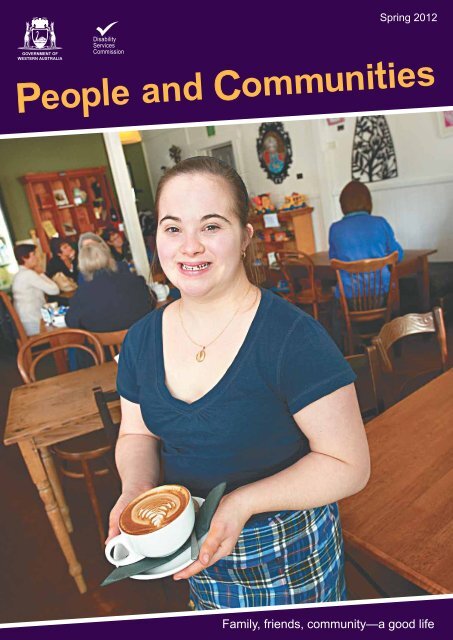
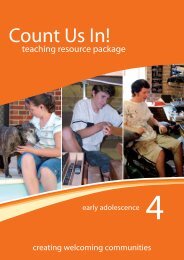
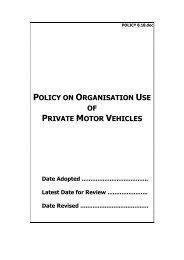
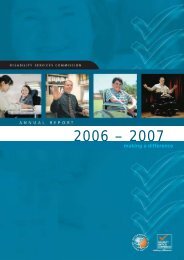

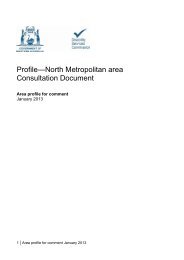
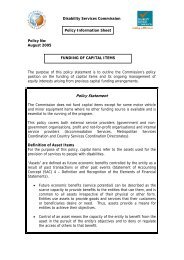
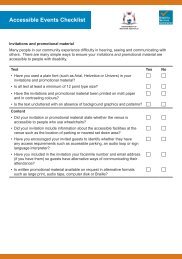
![Heerarka Adeegyada Naafada [PDF 102 kB] - Disability Services ...](https://img.yumpu.com/22096139/1/184x260/heerarka-adeegyada-naafada-pdf-102-kb-disability-services-.jpg?quality=85)
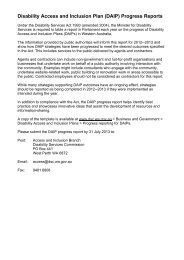

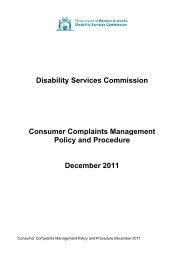
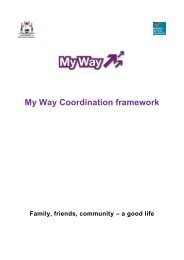
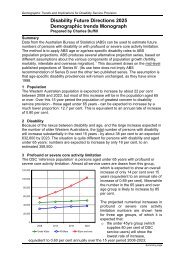
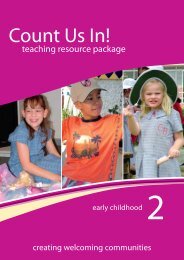
![معايير خدمات الإعاقة [PDF 297 kB] - Disability Services Commission](https://img.yumpu.com/22096120/1/184x260/-pdf-297-kb-disability-services-commission.jpg?quality=85)